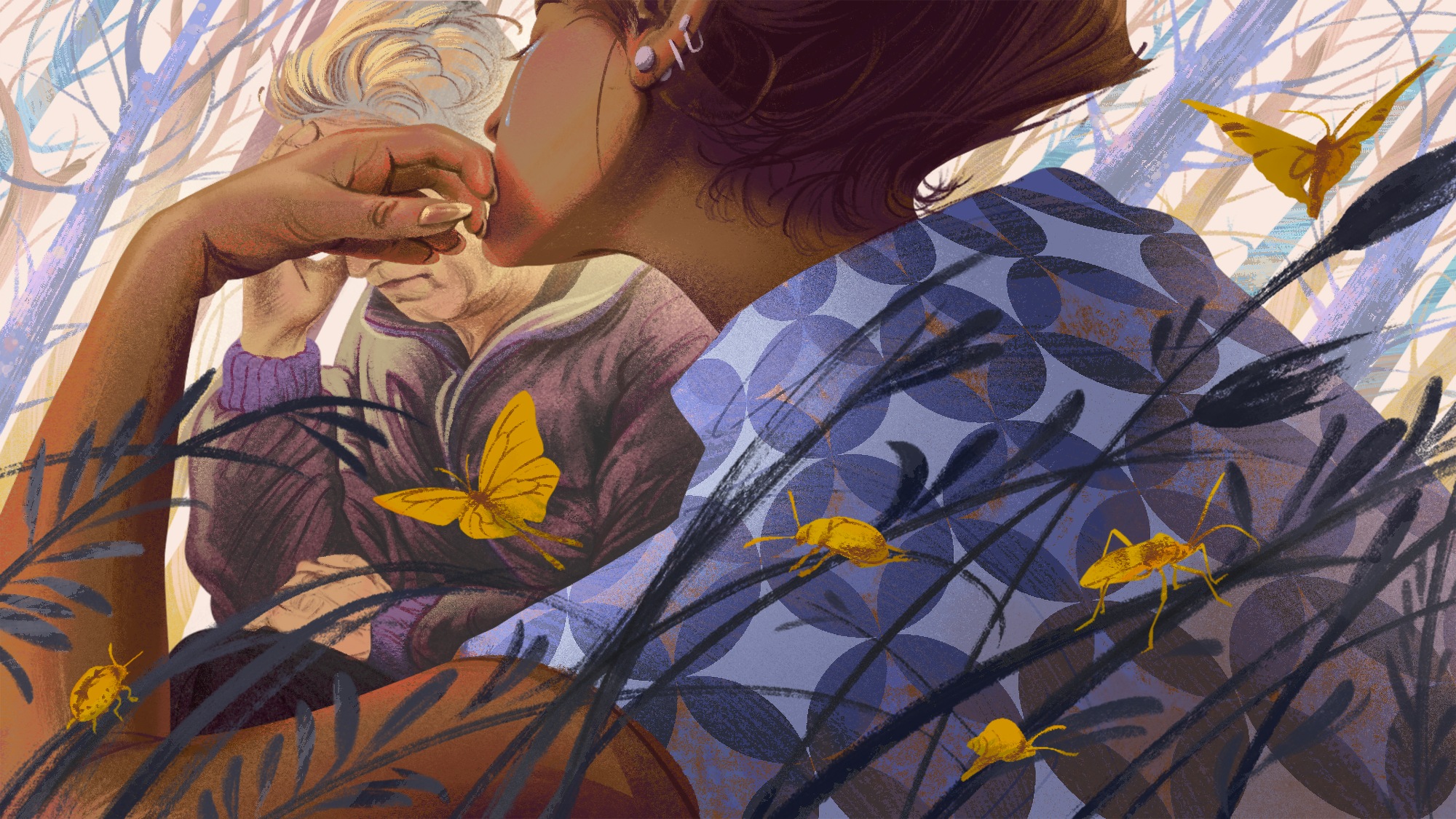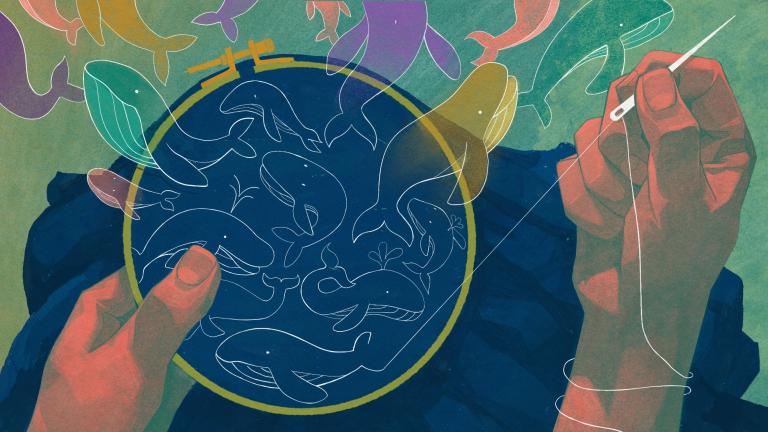Imagine 2200, Grist’s climate fiction initiative, celebrates stories that invite us to imagine the future we want — futures in which climate solutions flourish and we all thrive. Discover the 2025 contest winners. Or sign up for email updates to get new stories in your inbox.
The sun’s going down soft and slow behind Tiptree Ridge, silhouetting its willowy wind turbines, but the view’s not quite right. Vivian doesn’t realize she’s fidgeting until Auntie Dot looks over, her beautiful old face lit from below by the glow of her battered old tablet, and raises one baleful eyebrow.
“That ain’t a rocking chair,” she says. “And will not become one, no matter how you may squirm in it.”
Vivian finally notices her own shuffling feet, hears the rustling fabric of her camping chair, but her auntie’s still petty as all hell for remarking on it. “Lord, can’t a body move her body once in a while?” she demands.
“You could move it all the way back to your porch,” Auntie Dot says, “leaving me to the peace and solitude I normally enjoy on Ellen’s poker nights.”
But Vivian’s always sort of liked being scolded by Auntie Dot, how her voice goes from syrup to scalpels to syrup again.
“Got another of them historical werewolf romances loaded on there, huh?” Vivian asks, nodding to her auntie’s tablet.
“I might,” Auntie Dot says, unflappable. She sets it on the reclaimed wood arm of her chair and rubs her eyes. “Now, are you going to tell me what’s going on? I know you’re only here to hide.”
Vivian feels herself flush. “I came to see you!”
“And to hide,” Auntie Dot says. “Because you and your pa had a fight about something.”
Vivian grimaces, raises her hands in surrender. “Yeah. We fought.” She pauses. “He messaged you, huh?”
“I can tell when something’s wrong, Vivvy.” A notification darts onto the tablet screen like a minnow; Auntie Dot swipes it off. “But yes. Still is. Between the pair of you it’s a wonder I’m even halfway through this damn crossword.”
Vivian wants to formulate a joke about them putting erotica in crossword format now, but her heart’s not in it because her heart’s down in her gut, lead-heavy. She wants to tell Auntie Dot exactly what started the fight, but she doesn’t exactly know. The root problem is simple enough: She’s leaving. Her pa’s staying. Neither of them are terrific communicators.
“I don’t want to talk about it right now,” she says, leaning into that fact even though saying it makes her feel like a sulky 13-year-old all over again.
Auntie Dot looks at her for a long moment. Nods. “How about you make yourself useful, then,” she says, but all syrup, no scalpel. “Built in a Swissman’s style. Nine letters, starts with a c.”
Vivian frowns. “Lemme look at it,” she says.

Vivian stays long enough to suss out Corbusian and stylite and gular, then heads home. She forgot to plug her bike into Auntie Dot’s solar charger, but that’s OK – Vivian spent half her childhood pedaling up and down these winding gravel roads, and her legs are used to the work. She switches her lamp on as she pulls past the SLOWLY sign, the one she hand-painted as a welcome gift when Auntie Dot and her wife first moved out here.
The moon’s so bright Vivian hardly needs the halogen light. Bright and fat and low in the sky, pocked up how it is in cartoons. It reminds her of that clip her pa dug up when she complained about him only liking old movies, the one where the moon has a crumbling cheese face and gets a metal can in the eye, which they agreed looked extraordinarily painful and that the moon was a real tough customer for hardly flinching.
But she doesn’t want to think about movie night, and doesn’t want to hit a pothole and go ragdolling into the ravine, so she keeps her eyes on the road. It’s another warm night, and her graphene coldshirt does its best, but she’s still drenched in sweat by the time she chugs around the final bend. Her house comes into view, and somehow every part of it, from the crooked banisters to the solar-skinned roof to the blue-painted door, breaks her heart.
Her pa’s window is dark, but he left the porch light on. She coasts straight to the charging frame, timing her dismount so her feet crunch onto the gravel the same instant the bike clacks into place. One slot over, she sees the retrofit bush-hog her pa rented to clear storm-blown trees off the hiking trail. She makes sure it’s actually charging, since the plugs are finicky and her pa doesn’t always check. Then she unsticks her shirt from the slimy small of her back and climbs the porch steps.
The screen door is furred with buzzing insects, including a truly enormous gray moth, but that’s not what makes her pause. It’s the sight of the doorbell, a cheap old plastic thing she’s never really noticed until this very instant. She wonders, with a queasy feeling, if some day she’s going to feel like she has to ring it.
Tonight she lets herself in as she usually does, and even though she tries to step extra soft past her pa’s room, he hears her.
“That you, Viv?” he calls.
Usually she’d say who else, or nope, it’s your other daughter, but the memory of that afternoon’s argument makes it impossible. “Yeah,” she says.
There’s silence for a moment, like he might say something important.
“Night,” he mutters.
“Night,” she echoes back.

Vivian came by her conflict avoidance talents honestly; when she wakes up the next morning, her pa is already out of the house. She figures that’s for the best. She’s got packing to do, and it’ll be easier without him banging around in the background on some noisy little DIY project.
Her main suitcase is on its fourth and hopefully final configuration: favorite T-shirts rolled into compact crepes, shoes stuffed inside each other, a little nest of socks and underwear ready to cushion her VR headset, which will go in last-minute. There should be just enough space along the side for her posters. She sets to peeling them off the wall, starting with the blown-up aerial photograph of Osaka.
Vivian’s loved images of cities ever since she was little, thrilled by the novelty of crowds and skyscrapers and teeming streets. She knew she’d been born in Chicago, had even been a baby there for a few years before her mama died, so that added to her interest. Whenever she saw a city in movies or pictures, she could imagine her mysterious ghost mama wandering through it.
Her pa thought cities were one of humanity’s biggest mistakes, and when she got a little older his disdain became another factor in her fascination. She read everything she could about how cities came to be, how they were arranged, the many ways they grew and changed. She loved reading about plans gone wrong — Brasília, Dubai, Las Vegas — but also about the more recent successes in adaptation, mitigation.
Vivian rolls up Osaka and starts taking down her map of the Paris metro, another infrastructure favorite. Most people she knew laughed or shook their heads when she told them she was going to redesign cities some day. Now that she’s finally here, gearing up for a five-day drive to Sacramento to finish off her urban planning program in the field, everyone’s at least pretending to be proud of her.
Everyone except her pa. Remembering yesterday’s argument makes her angry all over again; she yanks too quickly and the metro map tears. She mentally cusses out her pa, because this too is his fault, then goes to the kitchen to find tape. She rattles open the junk drawer, starts rummaging. She’s pawing past a bunch of old pre-referendum leaflets — Make the Dole UBIquitous! — when her back pocket buzzes.
Only close friends and family get a buzz, so she pulls out her phone. It’s a message from Auntie Dot: Look at these two dopes. There’s an image attached, and when she sees it she forgets all about the tape.

Vivian finds her pa halfway down Good Fork Trail. He’s sitting on the trunk of a wind-felled tree, getting a few sips from his tea thermos while the bush-hog cools down, and when he squints up at her the wrinkles around his eyes look deeper and darker than usual, like he didn’t sleep.
“Hey, darling,” he says. “Wasn’t watching my phone. You need something?”
“Hey, Pa.” She stands there stupidly for a moment. “I don’t know. To talk, I guess.”
His eyes flicker to the bush-hog, and she can almost hear his next words: Sure, sure, just let me finish this up right quick, nearly done, promise we’ll talk later, plenty of time for talking later. But then he heaves a sigh and says something honest instead.
“Didn’t go real well yesterday.”
She feels her cheeks heat up remembering. “So let’s take another crack at it,” she says. “Maybe with us shouting less.”
His face twists. “I didn’t mean to shout, Viv.”
“I did,” Vivian admits. “Meant to throw some stuff, too. Just didn’t see anything aerodynamic enough.”
Her pa huffs a laugh, then gently sweeps a few beetles off the bark beside him. She takes the invitation and sits down. They’re quiet for a moment, listening to the woods: insects chirring, leaves rustling, a distant whippoorwill yammering its head off. She’s reaching for her phone when her pa finally speaks.
“I knew you’d move to the city someday.” He shrugs those broad bony shoulders she used to ride on. “I was figuring on Asheville, though. Maybe Charlotte. Not all the way across the country to one of the world’s worst flood-and-fire zones.”
“That’s where they need planners most,” Vivian says.
He shakes his head. “That’s where people shouldn’t be living at all. It’s hubris, pure and simple.”
“There’s no undo button for urbanization, Pa,” she says. “Even if there was, I wouldn’t push it. Humans group up for a reason. It’s resource-efficient, it’s space-efficient, it’s —”
“It’s exactly what got us into this mess,” her pa cuts in. “Bigger, newer, bigger, newer, tear it down and build it again —”
“You know that’s not what I’m going there to do,” Vivian snaps.
“You should be able to work from anywhere,” he says, building steam. “You spend half your time in VR anyways. We got it good here. We got the dole going up, good sun and wind, less fires up north now they’re finally reforesting properly …”
Vivian realizes this argument is going to be just like the last one and it was stupid to think otherwise, and even knowing that she feels her temper rising, a flurry of hot angry words ready to come flying out. She opens her mouth to tell him there are still plenty of places that don’t have it good, tell him she needs to be embedded in a community to plan for its needs. Tell him he’s impossible, and stubborn, and ruining their last week together for no reason at all.
But then his voice chokes off like an overgrown path, and when he blinks she sees a wet glisten in his eyes. The sight is strangely terrifying. She’s never seen him cry before, and she knows from Auntie Dot that the only time she’s ever seen him cry is at funerals: first the one for their parents, then the one for Vivian’s mama.
“Oh, hell, Vivvy,” he says. “I’m sorry. I’m sorry. Here I am putting doubts in your mind, making you feel guilty for nothing …” He shakes his graying head. “I’m just so scared of what happens next, is all.”
She feels a swell and ache in her throat. “You’ll be OK,” she croaks. “You got Auntie Dot, you got plenty of technician work, you got the mountain …”
“I ain’t scared of being lonely,” he says. “I’m scared of you getting swept off in a flood, or burned up in a fire, or —” He slaps his neck like to swat a mosquito. “Or you doing just fine and forgetting all about me. Lord, I’m selfish.”
“Sometimes, yeah.” Vivian reaches for her phone. “Not always.”
She holds out the photo Auntie Dot dug up: she and her pa standing in some plant-swathed alleyway of Tiohtià:ke-Montréal, her tiny and pudgy, him with thicker, darker hair. They did the trip for her 10th birthday, because she was obsessed with the city’s sponge parks and heat sinks and rooftop forests, the many ways they were adapting to things they couldn’t stop from happening.
Her 10-year-old self has a wide gappy grin as big as the moon, and when her pa takes the photo in hand he can’t help but laugh. “Look at you,” he says. “So damn happy. That smile made the whole trip worth it.” He tries one of his own; it comes out as more of a grimace. “I know this’ll be worth it, too. You leaving. I know you’re going to do big things.” He blinks hard. “And on the off chance you don’t, I’m so damn proud of you already it doesn’t matter.”
Vivian throws her arms around his neck and clings tighter than she has since she was a kid, and all the tears she’s stoppered up since making her decision come streaming out at once. His strong, warm hand cups her head, strokes her hair.
“Everything’s going to be different,” she chokes.
“Real different,” he agrees. “Guess we’ll —” He snorts back either a laugh or a sob. “Guess we’ll need an adaptation plan.”
Vivian groans at the joke but stays buried in the hug for a little while longer, thinking about how long-distance movie night will compare to the usual kind. The insects hum and shrill. The whippoorwill starts up again. When they finally pull apart and he checks the time on his phone, they see Auntie Dot sent him the same photo.
“That conniving sister of mine,” he says, shaking his head. “Trying to trick innocent folks into processing their emotions and whatnot.”
“We really don’t deserve her,” Vivian says, standing up. “I gotta pack more, run some errands in town. But I’ll be back at the house by sunset.” She pauses, because the next question feels more important than usual. “You gonna be back by sunset?”
“Wouldn’t miss it,” her pa says.

The sun’s going down soft and slow behind Tiptree Ridge, limning the tall trees with red-gold light, turning the wind farm into a spiky shadow play against the sky. Vivian glides slowly back and forth, her carved rocking chair nearly in sync with her pa’s. Auntie Dot claimed the wicker couch with all the pillows — she’s mostly been on her tablet, but looks up just long enough to give the last fiery splash of sunset an appreciative nod.
The silence is a comfortable one. Vivian’s gaze drifts from her aunt to her pa, whose eyes seem less tired now even though it’s getting late, then back to the mountain. It makes her heart do the good kind of ache.
She’ll be seeing new sights soon enough, and plenty of them — but for now, this view is just right.
Rich Larson was born in Niger, has lived in Spain and the Czech Republic, and is currently based in Canada. He is the author of the novels Annex and Ymir, as well as collections Tomorrow Factory and The Sky Didn’t Load Today and Other Glitches. His fiction has been translated into over a dozen languages, among them Polish, French, Romanian, and Japanese, and has been adapted into an Emmy-winning episode of Love, Death & Robots.
Violeta Encarnación is an award-winning Cuban illustrator illustrator based in New York City, known for her vibrant, storytelling-driven visuals across traditional and digital media. Her work has appeared in publications like The New York Times, Sports Illustrated Kids, and The Washington Post. Her latest illustrated picture book, Together We Remember, published by Penguin Random House, is currently available for preorder. Violeta’s art often explores our connection to nature and each other, inviting viewers to reflect on these relationships.





